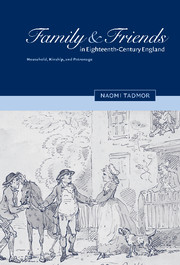Book contents
- Frontmatter
- Contents
- Acknowledgements
- A note on the text
- List of abbreviations
- Introduction
- 1 The concept of the household-family
- 2 The concept of the household-family in novels and conduct treatises
- 3 The concept of the lineage-family
- 4 The language of kinship
- 5 Friends
- 6 Political friends
- 7 Ideas about friendship and the constructions of friendship in literary texts
- Conclusion
- Bibliography
- Index
4 - The language of kinship
Published online by Cambridge University Press: 30 July 2009
- Frontmatter
- Contents
- Acknowledgements
- A note on the text
- List of abbreviations
- Introduction
- 1 The concept of the household-family
- 2 The concept of the household-family in novels and conduct treatises
- 3 The concept of the lineage-family
- 4 The language of kinship
- 5 Friends
- 6 Political friends
- 7 Ideas about friendship and the constructions of friendship in literary texts
- Conclusion
- Bibliography
- Index
Summary
The kinship-family
Having reached this point we are faced with the question of kinship. If people in seventeenth- and eighteenth-century England could understand relations with non-kin in familial terms, and if within families kin and non-kin could be contractually bound, yet if at the same time notions of lineage were also valued – how in view of all this did people perceive relations with kin? And how can their language help us to probe further concepts of family and kinship current in seventeenth- and eighteenth-century England?
Starting from our main keyword so far, we can see that the word ‘family’ was also used in the eighteenth century to refer to circles of kin both within and beyond households. To present-day English speakers, this concept of the kinship-family seems obvious. This is the main usage of the word today, and English speakers have no difficulty in identifying it when it also appears in texts from the past. For instance, when present-day readers find in an eighteenth-century novel, such as The History of Miss Betsy Thoughtless, that Betsy thanks another character for his goodness to her and ‘all our family’, they can easily understand that this single and childless heroine is referring to her near kin, members of her nuclear family of origin.
- Type
- Chapter
- Information
- Family and Friends in Eighteenth-Century EnglandHousehold, Kinship and Patronage, pp. 103 - 166Publisher: Cambridge University PressPrint publication year: 2001

